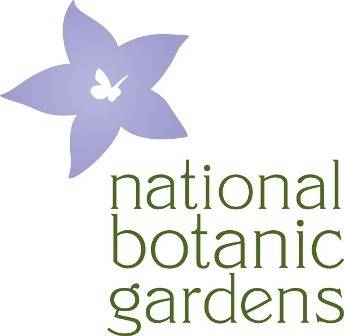
Matthew Jebb has taken over the directorship of the National Botanic Gardens following the departure of Peter Wyse Jackson. Matthew has been Keeper of the Herbarium and Taxonomist (Ainmneoir Plandai) at the Gardens since 1998.
Matthew gained his primary degree in Botany at Oxford University, where he also pursued his Ph.D. on the Tuber morphology and taxonomy of the rubiaceous Ant-Plants. Following this Matthew returned to Papua New Guinea, where he had conducted his reasearch for his Ph.D., and was made Director of the Christensen Research Institute from 1987 to 1993. He continued his taxonomic interests on a range of tropical plant groups from South east Asia, including the Pitcher plants (Nepenthes), Screw-pines (Pandanus) and ant-plants (Myrmecodia, Hydnophytum and Anthorrhiza) as well as publishing articles on coral reef ecology, fish taxonomy, climatic history of the south pacific and wasp predation of spiders.
Before joining the staff of the National Botanic Gardens in 1996, he was a post-doctoral researcher at Trinity College, working on the Ivy family (Araliaceae) of Thailand. In 2005 Matthew was nominated by Ireland as the European vice-president on the bureau of the Conference of the Parties to the Convention on Biological Diversity. This role culminated at the Eighth meeting of the Conference of the Parties in Curitiba, Brazil in March 2006. The Convention is one of the United Nations Environment Program’s most significant bodies for the conservation of nature at a global scale, and has been ratified by more countries than any other international convention.
Matthew is currently Chairman of PlantNetwork, the Plant Collections Network of Britain and Ireland, which represents nearly 100 of the leading plant collections in these islands and provides training and collaborative activities. Hydnophytum kajewskii, a species of ant-plant from Bougainville island He is also chair of the Praeger Committee of the Royal Irish Academy, which promotes the noble tradition of field natural history by non-professionals through representation at the Academy and the provision of annual grants in support of fieldwork.
His current research interests are varied, and include the Irish flora – its origins and conservation, the flora of Clare island and other small island floras, as well as taxonomic revisions of the genus Hydnophytum (left) and studies on the phylogeny and biogeography of Nepenthes.
On taking up the position, Matthew said “We will be putting plants and horticulture at the centre of our management of the Gardens – developing the quality of the collections and building on the horticultural skills for which we are justly famous. Climate change and the impact of invasive pests and diseases represent some of the many challenges facing plant collections, as well as our native flora. We therefore look forward to an era of building upon our historical links with the great gardens, and gardeners, of Ireland, to ensure that we are able to overcome these problems together and allow our collections to flourish for future generations.”
